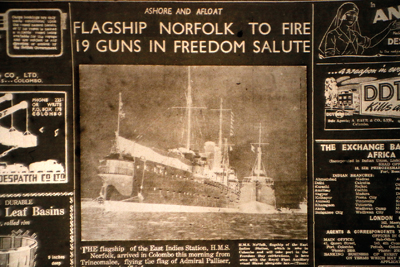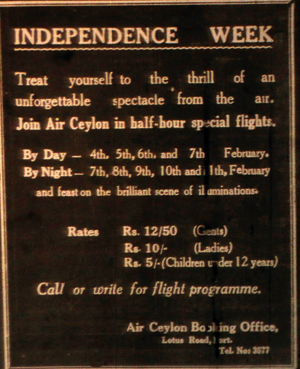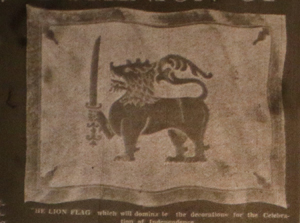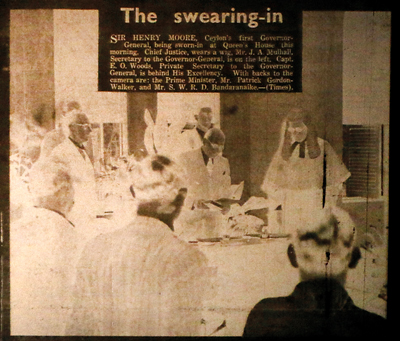When February 4 dawned 71 years ago

Snapshots from newspapers of the day (above and below): Times of Ceylon - February 3 1948 - The arrival of the flagship of the East Indies Station HMS Norfolk to fire the 19-gun salute
As church and temple bells pealed, guns boomed and ship sirens shrieked, 7.30 a.m. on the dot, a formally-dressed gentleman entered the august Audience Hall of Queen’s House in the Fort as Governor and exited a few minutes later as Governor-General (GG).
This seven-minute ceremony — an oath taken before Chief Justice Sir John Howard heralded the birth of a free nation!
It was Wednesday, February 4, 1948, seventy-one years ago when history was made at Queen’s House (now President’s House).
With Sir Henry Monck-Mason Moore taking oaths as the GG of Ceylon, the power to rule was officially handed over by the British to the first Prime Minister (PM), Don Stephen Senanayake, who had been voted in by the people at the first parliamentary election after Ceylon attained dominion status the previous year, in August 1947.
The oath-taking over, the eminent personalities retired to the drawing room to drink a hearty toast proposed by the GG to the PM, his Cabinet and Ceylon.

Times of Ceylon - February 3 1948 - Half-hour special flights by Air Ceylon for anyone who wished to see the celebrations by air
By 9.15, the GG addressed the nation over the radio, followed by the PM at 9.45 a.m.
It brought to an end 133 years of British colonial rule in Ceylon after a “long struggle…..where there was no record of violence but a patient and persistent campaign carried on with exemplary regard for constitutional procedure” as enunciated by none other than Herwald Ramsbotham Soulbury of Constitution fame.
Proudly, the Lion Flag fluttered alongside the Union Jack.
Poring over hardly-able to read microfilms of reports in the Ceylon Observer, the Ceylon Daily News, the Dinamina and the Times of Ceylon of the time at the National Archives, a Sunday Times team recreates the events of about two weeks to bring to our readers a comparison of then and now, as we greet the 71st Independence Day tomorrow.
Interestingly, the flagship of the East Indies Station, HMS Norfolk, had arrived in Colombo from Trincomalee, flying the flag of Commander-in-Chief Admiral Arthur Palliser to fire the 19-gun salute soon after the swearing-in ceremony. This and all other ships had been “dressed” for the occasion.
A unique feature was half-hour special flights by Air Ceylon for anyone who wished to see the celebrations by air, at a princely fee of Rs. 12.50 for men and Rs.10 for women.
The country erupted in celebration, with the solemn chanting of Maha Pirith from the Kelaniya Raja Maha Viharaya being broadcast over the radio and religious rituals at temples, churches, kovils and mosques.

Ceylon Daily News - February 4, 1948 - The Lion Flag which was to dominate the decorations for the celebrations
The Governor General and Lady Moore attended an evening service at Pettah’s Wolvendaal Church; the Speaker of the House of Representatives, A.F. Molamure and Finance Minister J.R. Jayewardene were at the Maligakanda temple and Labour and Social Services Minister T.B. Jayah at the Maradana mosque, while special prayers were held at the Sri Ponnambalavaneswarar kovil in Kochchikade.
Colombo had turned into a fairyland with twinkling lights adorning Queen’s House, Temple Trees, House of Representatives, Senate Buildings, Customs, the Clock Tower on Chatham Street and Fort Station.
Whether stately public buildings or humble homes, a profusion of flags and bunting in red, gold, white and blue lent colour and life to this memorable day, as coloured electric jets, tubular lights and floodlights lit up the city.
The festivities beginning as the clocks chimed midnight on February 3 included a spectacular Water Festival which lit up the southeast breakwater of the Colombo Harbour.

Times of Ceylon - February 4 1948 -Sir Henry Monck-Mason Moore taking oaths as the GG of Ceylon
Not forgetting the patriots who had fought for independence but were no more, the Lion Flag fluttered in the morning breeze of February 4 at the F.R. Senanayake Memorial and a perahera paid him homage. Ceremonies were also held at the statues of Sir Ponnambalam Ramanathan and Sir Ponnambalam Arunachalam.
The day also witnessed public meetings, flag-hoisting ceremonies (with H. Don Carolis and Sons Ltd., advertising the sale of Lion Flags in silk), feeding of the poor and children’s sports, while 1,886 prisoners among whom were nine on death row walked out as free people.
In holiday mood, vast crowds visited the Dehiwela Zoo, all for free, at the rate of 350 a minute, reaching 8,000 by 11 a.m. as well as the harbour and museum.
| Opening of Parliament: Highpoint of celebrations | |
 The highpoint of the celebrations was the dominion Parliament being opened at the Independence Memorial Hall by the Duke of Gloucester, Prince Henry, on Tuesday, February 10, at 10.10 a.m., with even Pope Pius XII sending Monsignor Vagnozzi to represent him. The highpoint of the celebrations was the dominion Parliament being opened at the Independence Memorial Hall by the Duke of Gloucester, Prince Henry, on Tuesday, February 10, at 10.10 a.m., with even Pope Pius XII sending Monsignor Vagnozzi to represent him.More than a thousand policemen were on duty and a special traffic plan was strictly enforced, while nearly 50,000 people had sought tickets for admission to the hall. The vehicle of the Duke and Duchess, Prince Henry and Princess Alice, flying the Union Jack was accompanied by the motorcycle of the Official Commissioner and a police vehicle. It was followed by the PM’s vehicle with the Lion Flag. |
| Galle Mayor boycotts event | |
| The Lion Flag had been unfurled, parades held, the National Anthem sung with gusto, bells rung, tom-toms beaten and conch shells blown all over the country on February 4. In Galle, however, Mayor W.T. Wijekulasuriya refused to participate in the celebrations held at the esplanade organized by Government Agent W.O. Stevens……due to being convinced that “the expenditure of Rs. 800,000 at a time when unemployment, distress and poverty were widely prevalent was unconscionable”. |


